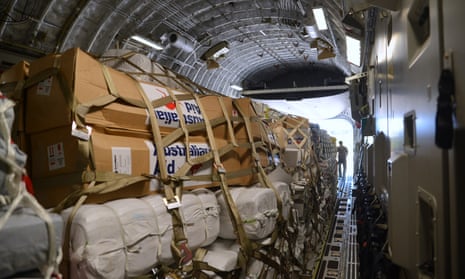The Abbott government’s energy white paper made headlines for its curious reluctance to mention climate change – but the looming defence white paper may prove to be a different story.
A report on community consultations associated with the defence white paper flags the consequences of climate change, extreme weather events and environmental pressures as a significant security risk for Australia – second only to the risks posed by terrorism.
“Many people suggested [climate change] would lead to an increased need for humanitarian and disaster relief activities, including by armed forces,” the report released on Wednesday said.
“Some people also noted that climate change and resource stresses, such as food and water shortages, could drive unregulated cross-border movements of people.”
The consultations also unearthed “considerable interest in evolving the ADF [Australian defence force] to reduce its greenhouse gas emissions and manage its environmental impact.”
“That interest was not confined to environmental groups, and such efforts were viewed as being not only good management of resources, but also likely to improve the ADF’s operational flexibility and survivability.”
The Australian Strategic Policy Institute’s executive director, Peter Jennings, who oversaw the consultation process, said recognising the impact of climate change did not actually require anyone to “take a position on the causes of climate change”.
It was a simple strategic calculation, and one the defence white paper needed to grapple with.
“I think our thinking here is simply to say that defence needs to make sure it’s able to manage, as it were, strategic consequences of climate change,” Jennings told Guardian Australia on Wednesday.
“Even if we don’t need to take a position on the causes of climate change we do need to understand how defence forces might be called upon to respond to effects which are the products of climate change. That’s something that needs to be addressed in the white paper context.”
Jennings said defence force personnel were often required to help respond to extreme climate events in Australia such as floods, bushfires and cyclones. “Again, the question is, if we’re seeing these extreme weather events – put to one side the cause of these things - we do need to have adequate defence plans in place to respond to them.”
Labor’s defence white paper in 2013 acknowledged the effects of climate change and associated resource pressures could increase the risk of insecurity and conflict.
Wednesday’s consultation paper also flags interest in Australia acquiring nuclear-propelled submarines. “A few people suggested that, even if Australia was committed to a conventional submarine to replace the Collins class, work should begin soon on the national infrastructure to support a subsequent nuclear-powered submarine by mid century.”
The idea of Australia acquiring nuclear powered submarines, and establishing a domestic industry to support such a fleet, has been kicked around in Canberra since the mid 2000s. Jennings said previous defence white papers had stated opposition to nuclear propulsion, and the government needed to explain its rationale in more detail.
“I think people are looking to try and understand why [the option has been ruled out],” he said. “I think part of the argument is there is probably not a broad community acceptance at this stage and we don’t have the right infrastructure – civilian or military – to support it.”

Comments (…)
Sign in or create your Guardian account to join the discussion